

Leadership In The Age Of Complexity: From Hero To Host, by Margaret Wheatley and Deborah Frieze. For too long, too many of us have been entranced by heroes.

Perhaps it’s our desire to be saved, to not have to do the hard work, to rely on someone else to figure things out. Constantly we are barraged by politicians presenting themselves as heroes, the ones who will fix everything and make our problems go away. The Quickening In Mobile — Early Lessons From A Walkabout. Everything I Know: 42 Hours of Buckminster Fuller's Visionary Lectures Free Online (1975) Think of the name Buckminster Fuller, and you may think of a few oddities of mid-twentieth-century design for living: the Dymaxion House, the Dymaxion Car, the geodesic dome.

But these artifacts represent only a small fragment of Fuller's life and work as a self-styled "comprehensive anticipatory design scientist. " In his decades-long project of developing and furthering his worldview — an elaborate humanitarian framework involving resource conservation, applied geometry, and neologisms like "tensegrity," "ephemeralization," and "omni-interaccommodative" — the man wrote over 30 books, registered 28 United States patents, and kept a diary documenting his every fifteen minutes. Brave New World Revisited (1958) by Aldous Huxley. Contents Foreword I Over-PopulationII Quantity, Quality, Morality III Over-Organization IV Propaganda in a Democratic Society V Propaganda Under a Dictatorship VI The Arts of Selling VII Brainwashing VIII Chemical Persuasion IX Subconscious Persuasion X Hypnopaedia XI Education for Freedom XII What Can Be Done?
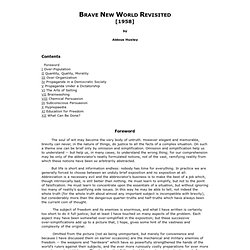
Foreword The soul of wit may become the very body of untruth. However elegant and memorable, brevity can never, in the nature of things, do justice to all the facts of a complex situation. Where the Good and Bad Jobs Will Be Ten Years From Now. Home health aides, administrative assistants, and fast food servers: these are some of the occupations that are going to grow the most in the coming years.
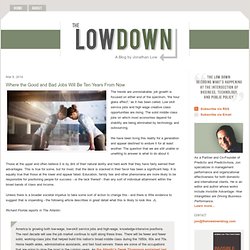
As the Atlantic’s Derek Thompson explained last month, "just a handful of occupations—personal care aides, registered nurses, nursing assistants, and home health aides (all in health care), along with retail salespeople and food-prep workers—will account for one-in-six new jobs in the next decade. " This analysis comes from the Bureau of Labor Statistics's latest ten-year projections, which provide a broad picture of what America’s workers will be doing in the future.
On the Phenomenon of Bullshit Jobs. Ever had the feeling that your job might be made up?
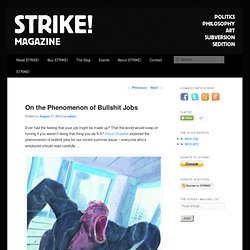
That the world would keep on turning if you weren’t doing that thing you do 9-5? David Graeber explored the phenomenon of bullshit jobs for our recent summer issue – everyone who’s employed should read carefully… On the Phenomenon of Bullshit Jobs by David Graeber. In the year 1930, John Maynard Keynes predicted that, by century’s end, technology would have advanced sufficiently that countries like Great Britain or the United States would have achieved a 15-hour work week. There’s every reason to believe he was right. Technological Growth and Unemployment: A Global Scenario Analysis. Technological Growth and Unemployment: A Global Scenario Analysis Riccardo Campa Institute of Sociology Jagiellonian University r.campa@iphils.uj.edu.pl Journal of Evolution and Technology - Vol. 24 Issue 1 – February 2014 - pgs 86-103 Abstract.
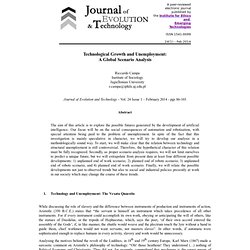
Radical Transparency. Radical Transparency Making information available to every employee helps avoid bad decisions... read Dharmesh Shah Co-Founder & CTO, HubSpot.
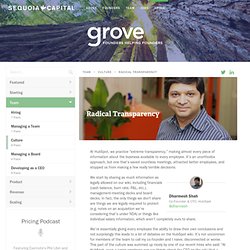
The “sharing economy” is being pulled ever farther from actual sharing. The “sharing economy” has seen a rapid slide away from collaborative sharing towards further deregulated and precarious employment — the direct consequence of venture capital funding and the growth imperatives that come with that money.
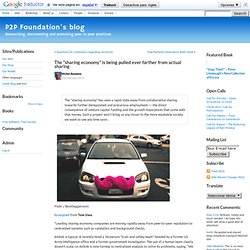
Such a project won’t bring us any closer to the more equitable society we want to see any time soon. Flickr / Bootleggersson Excerpted from Tom Slee: “Leading sharing economy companies are moving rapidly away from peer-to-peer reputation to centralized systems such as validation and background checks. Airbnb is typical. Economy of Insight—Conversations as Transactions. Extended abstract Every day we open so many emails, respond to so many text messages and get so overwhelmed by the digital deluge, we wonder how we find time to do any work.
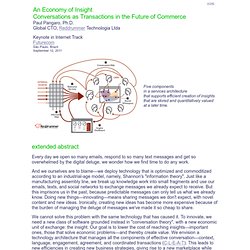
And we ourselves are to blame—we deploy technology that is optimized and commoditized according to an industrial-age model, namely, Shannon's "information theory". Lucy Suchman « Robot Futures. The recently concluded DARPA Robotics Challenge (DRC), held this past week at a NASCAR racetrack near Homestead, Florida, seems to have had a refreshingly sobering effect on the media coverage of advances in robotics.
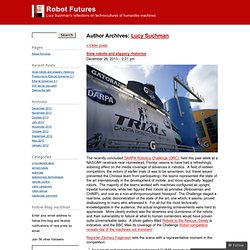
A field of sixteen competitors, the victors of earlier trials (it was to be seventeen, but ‘travel issues’ prevented the Chinese team from participating), the teams represented the state of the art internationally in the development of mobile, and more specifically ‘legged’ robots. The majority of the teams worked with machines configured as upright, bipedal humanoids, while two figured their robots as primates (Robosimian and CHIMP), and one as a non-anthropomorphised ‘hexapod’.